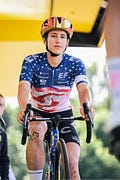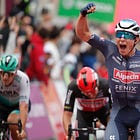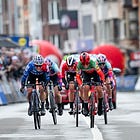This being the end of the season, with no road racing to preview or break down or recap, there’s not that much to write about. Fortunately, I’ve spent my entire life in the sports content creation trenches, and know all the tricks. Nostalgia, frivolity, and above all, lists.
So welcome to the inaugural All-Wheelysports Team. This is not a list of the best riders in the world, though there’s obviously substantial overlap between this list and a theoretical all-star team. It’s also distinct from the Top 41 Riders list I started publishing late last year and intend to renew for 2025; that’s a forward-looking exercise, meant to preview the forthcoming season. These riders animated the season just gone; I spilled a lot of figurative ink on each of them. Is it just a list of writers I covered the most? Not really, because (for example) Demi Vollering and Wout van Aert were two of the main characters of this newsletter in its first season, and I dunno, it feels like both of them had moderately disappointing seasons.
So it’s a mix of skill, achievement, notoriety, and something ineffable. These riders exemplify the values of the Wheelysports cycling newsletter. “Which are…?” I can hear you asking. And that’s a good question. I guess my response is that if you want a coherent editorial viewpoint, you’ve come to the wrong place.
Best I can put it is this: I like riders who are versatile, animated, and courageous. Who are willing to Try Shit, and through feats of cleverness or sheer cardiovascular force pull off the unexpected. Most of all, because this is a newsletter by and for multi-sport fans rather than true cycling purists, I want riders who illustrate something compelling about this sport. The suffering, the solitude, the complexity of the on-the-fly game theory each rider has to compute. I hope that’s intelligible enough. I guess if you want something more rigid, you should encourage all your friends to subscribe, because as the audience grows I’ll feel less comfortable being this capricious.
Honorable Mentions (in no particular order)
Jan Tratnik, 34, Slovenia, Visma-Lease a Bike, Rouleur/Time Trialist/Classics Specialist
Shirin van Anrooij, 22, Netherlands, Lidl-Trek, Puncheur
Elisa Longo Borghini, 32, Italy, Lidl-Trek, GC Specialist
Brandon McNulty, 26, United States, UAE Team Emirates, GC Specialist/Time Trialist
Remco Evenepoel, 24, Belgium, Soudal-Quick Step, GC Specialist/Time Trialist
Lotte Kopecky, 28, Belgium, SD Worx, Classics Specialist
Mathieu van der Poel, 29, Netherlands, Alpecin-Deceuninck, Classics Specialist
Kasia Niewiadoma, 30, Poland, Canyon-SRAM, Climber/Puncheur
Kim Cadzow, 22, New Zealand, EF-Oatly-Cannondale, Climber
Lennert Van Eetvelt, 23, Belgium, Lotto-Dstny, Climber
Adam Yates, 32, United Kingdom, UAE Team Emirates, Climber
All-Wheelysports First Team
Tadej Pogačar, 26, Slovenia, UAE Team Emirates, All-Rounder
I know I just said this wasn’t going to be a list of the best riders in the world, or the ones I wrote about the most, but this guy just had the best season in cycling history. He won the Triple Crown, plus two monuments, plus Strade Bianche, and he won most of those races by just ludicrous margins.
More than that, Pogačar didn’t just sit tight and let his teammates do all the work. Nor did he zone out and ride everyone off his wheel. He attacked all the time, and was animated and emotional on those rare occasions when someone had the legs to make it an interesting tactical fight.1
If there’s a disappointment in Pogačar’s season, it’s that he skipped a (possibly unique) opportunity for a Giro-Tour-Olympics-World Championship quadruple. But even his absence was cool as hell, because Pogačar (allegedly) stayed home to stick it to the Slovenian national governing body for leaving his partner off the women’s Olympic team.
I dunno, this guy called his shot, like Babe Ruth, and he delivered. I don’t care that everything’s been said already; it’s worth hearing again.
Grace Brown, 32, Australia, FDJ-Suez, Time Trialist
Brown won one of the best races of the year,2 Liège-Bastogne-Liège Femmes, despite being outnumbered and outgunned in a reduced bunch. And also despite having almost gone ass-over-tea kettle while going around a traffic circle just before the finish.
That win alone would’ve been an incredible swan song for the retiring Australian veteran—the biggest win of her career to that point—but Brown signed off with a season of utter dominance against the clock. Five wins in seven starts in individual time trials, including at the Australian national championships, the world championships, and the Olympics, where she crushed a field that had trouble staying upright on slick cobbles.3 Plus a gold medal in the mixed team time trial at worlds. Plus second place by 0.87 seconds at the Giro d’Italia ITT.
This from a rider who’d been pretty good throughout her career. But, like, in the conversation good, not wrecking house good. If I were crowning a breakout rider of the year, Brown might be it, even though she’s 32 and due to retire at the end of the year. I’ve complained about it every time I’ve written about her this season, and I won’t stop, because she was a joy to watch this season.
Biniam Girmay, 24, Eritrea, Intermarché-Wanty, Sprinter
Biniam is what I’ve been referring to this year as a hybrid sprinter, someone who can hold his own on a flat bunch sprint but also climb enough to be a threat in one-day races and grand tour breakaways. I find pure sprinters a little boring, but hybrid sprinters4 are one of my favorite rider types.
And to be honest, I thought that if Bini—who was in need of a bounceback season after a pretty rotten previous 18 months—was going to have a breakthrough, it’d be in a classics race. He got close: Second at GP Quebec and Binche-Chimay-Binche5 and top 10 at Gent Wevelgem. But his season came down to the Tour de France, where he won three stages and the green jersey.
Stripped of context, that’s a huge achievement, and he earned it. It was a performance reminiscent of prime Peter Sagan. But to do it from basically out of nowhere, for an absolutely crap team, and consistently beat Jasper Philipsen on terrain that favored the speedy Belgian…that’s doubly impressive.
And then you have to factor in that he became the first Black rider to win a stage of the Tour de France, and the first Black rider to win any classification of the world’s most famous cycling race. It’s historic. There’s a broader conversation about race in top-level European sports, or European society in general, to which Biniam is a party whether he wants to be or not. But that conversation will still be there tomorrow. For now: It’s a hell of a thing he accomplished.
Matteo Jorgenson, 25, United States, Visma-Lease a Bike, All-Rounder
The load-bearing column of my cycling fandom is waiting for the Next Big Thing. I missed, by about five years, the best time in history to be an American cycling fan. (Even though it all went to shit in a big hurry once they found out about all the drugs and cheating.) Basically, I’m coming out of my shoes swinging every time there’s a remotely promising young American. It’s why I got out over my skis for Tejay van Garderen, Andrew Talansky, McNulty, Chloe Dygert, Megan Jastrab, Magnus Sheffield…I try to be this open-minded citizen of the world, but deep down I’m pathetically jingoistic. Just give me an American to root for.
Sepp Kuss winning the Vuelta in 2023 was a turning point, and while he’s one of the best and most-respected riders in the peloton, I think everyone—including Kuss himself—views that win as a bit of a fluke, and unlikely to be repeated.
Not that it matters; I’ve written over and over that between Kuss, McNulty, Sheffield, Neilson Powless, Quinn Simmons, and the up-and-coming kids, the American men have their deepest bench in 20 years. We don’t need A Guy.
Nevertheless, we have one. Jorgenson is The Guy.
He’s a shoo-in for one of the best teams in the world, as a classics co-leader, and the final domestique at the Tour de France. He won Paris-Nice and Dwars Door Vlaanderen, and almost won the Dauphiné and Kuurne-Brussels-Kuurne, which evinces a level of versatility that we’d be freaking out about if Pogačar hadn’t wrecked the curve.
Not that I’m not freaking out anyway.
Ben O’Connor, 29, Australia, Decathlon-AG2R La Mondiale, Climber
I was not a big O’Connor fan heading into this season. As a rule, I don’t love climbers who are weak time trialists, and O’Connor didn’t really have the attacking bona fides to make himself an exception. He was one of the stars of the second season of Unchained, and he mostly used his screen time to complain. He was in the thick of the fight at this year’s Giro—at least, the thick of the fight for second place—but found himself the odd man off the podium.
All that changed with one dominant breakaway at the Vuelta, where O’Connor rode off and nobody chased him. It was an astonishing tactical abdication, one which allowed the Australian to gain four and a half minutes—which is some 1980s shit—on the peloton.
Over the next two weeks, O’Connor clung tenaciously to the head start that had fallen into his lap. But eventually Primož Roglič—a better rider—and his better-resourced Red Bull-Bora-Hansgrohe squad bled him dry 20 or 30 seconds at a time. O’Connor had to settle for a highly charismatic second place, then finished his season with a silver medal at the world road race championship. Once again, O’Connor got the tactical drop on everyone but couldn’t outleg a superior Slovenian climber.
I mentioned earlier that I wanted the riders on the All-Wheelysports Team to represent something compelling about the sport. O’Connor does that in two respects. First, he had a remarkable season—fourth at the Giro, second at the Vuelta and worlds, high finishes at a variety of one-week stage races, including second at the UAE Tour—without actually winning much. The Vuelta stage win was an iconic performance, and it gave O’Connor two things: The full set of grand tour stage wins and a memorable fortnight in red.
But was it Ringzzzz-worthy? Probably not. Which is point no. 1: Cycling is about winning, but if you don’t win it’s also about how you lose. Did you give it your all, did you give the crowd something to cheer for, did you push your opponent to the limit? How you play the game matters a great deal, and at the Vuelta, O’Connor defined the race—even in defeat—by reaching a level no one had seen him achieve before. Maybe not even O’Connor himself.
Nevertheless, he watched it all bleed away slowly, which is point no. 2. Cycling, to me, is about waiting for disaster. It can come in a moment of overexertion, or it could come gradually, inevitably, and painfully, over a period of weeks. Like a Graham Greene novel. Did O’Connor’s season end in painful, arduous defeat? Sure. But so did Hector’s Iliad.
Wheelysports Rider of the Year
Kristen Faulkner, 31, United States, EF-Oatly-Cannondale, Classics Specialist
See, I told you this was going to be idiosyncratic. Obviously Pogačar is the most accomplished rider of 2024. The most accomplished female rider of the year? I could hear arguments for Longo Borghini, Vollering, Brown, Kopecky…Faulkner probably wouldn’t be that high on the list. The Olympic gold medal is huge, but it’s not a monument or a grand tour, and her other victories—a Vuelta stage, a national road race title, Omloop—aren’t Rider-of-the-Year level.
But there’s not a single rider I enjoyed watching more this season.
I’ve written about this before, but I’ll rehash it here: In the immediate aftermath of the 2022 World Cup final, a lot of people said it was the greatest soccer game of all time, maybe the best sporting event ever. I found that assertion at best dubious, at worst highly disrespectful to the men’s 4x100 freestyle relay at the Beijing Olympics. But I got where people were coming from.
Every sporting event is defined not only by what happens, but by what could happen. It’s not only getting the big hit, but the excitement over the possibility of a big hit, whether it happens or not. What made that World Cup final so memorable is that from about the 70th minute on, every fork in the road led to the more memorable outcome.
And that’s basically Faulkner’s Olympic road race. One “wouldn’t that be cool if…” after another actually coming to pass. From Dygert’s crash that split the field to Faulkner’s decisive and millisecond-perfect final attack. I would not change a thing about that race.
Two qualities about Faulkner made that possible. First: Despite being over 30, she’s a relative newcomer to the sport. She’s not a naive racer; on the contrary, she has a pretty solid instinctive handle on when to attack. But she races with the abandon of a rider who doesn’t fear defeat. She takes chances, she pulls her turn at the front of a breakaway even when it might not be strictly to her tactical advantage.
And she has an uncommon ability to dig her back wheel into the pavement and just let it rip. Not in the sense of being a great long-range time trialist or a great short-range sprinter—though she can hold her own in both disciplines. Too often, the final selection in a race ushers in a boring interregnum. Attacks from a reduced bunch are desultory; nobody actually expects them to work.
I don’t know if Faulkner is just stronger than everyone else, or if she’s more committed, but she can make those moves work. And the possibility of such a move—there it is again—makes every race dramatic throughout. Whether it’s for her own sake, or a teammate’s,6 Faulkner seems to have a bigger engine when it counts.
Cycling can be completely inscrutable at times. Faulkner makes it look simple.
Cf. Pogačar v. van der Poel at Milan-San Remo (2024)
Oh, you’d better believe that’s going to be its own article too
Which, I guess, is not uncommon for Chloe Dygert
Van Aert, Magnus Cort, Marianne Vos, and so on
Not to be confused with the summer study abroad program I went on in Brussels, which I’d describe as “Beer-Chimay-Beer”









